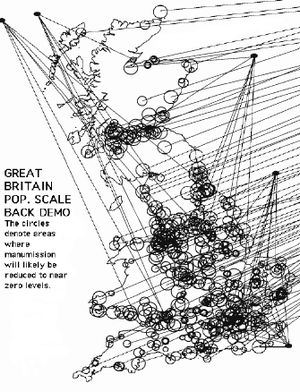Manumission
Manumission is the amount of contributing greenhouse gases produced by the human race towards global warming. It differs from pollution in that manumission is the product of the human body's natural processes, while pollution results from man-made, industrial processes.
Environmentalists are concerned about the growing rate of manumission. Since it is directly proportional to the human population of the planet, manumission has exponentially ballooned, especially since the twentieth century. Predictions are that manumission will continue to rise, becoming a more and more dire problem as the years continue.

History[edit | edit source]
Manumission had been established in some countries in the early eighteenth century, but the reason behind the change was largely unknown. Word spread slowly from traders' and tourists' mouths about the pleasurable benefits of manumission, carrying tales from those far off lands about the enjoyment they experienced with the free release of their greenhouse gases.
The populace of England were among the first to experiment with manumission, and they enjoyed it so much that the country established it as law in the late eighteenth century (Beans, it should be noted, became a very popular import during this time). As England was considered as one of the most powerful and influential, as well as one of the most enlightened (which it was in vogue to be at that time) world powers, manumission quickly spread throughout the known world.
The rise of manumission is the traditional cause of the Industrial Revolution. Since stuffy nobles and gentry no longer had to bottle up their greenhouse gases or let them silently out in a private place in the name of civility, industrial pioneers thought that the citizenry would hardly mind if harmful gases were produced as the by-product of steam power. This resulted in an industrial boom, dotting factories around the idyllic landscapes of Europe, filled with smiling women and children who were happy to release gases - both natural and artificial.
Potential Solutions[edit | edit source]
Environmentalists estimate that 450 billion tons of carbon dioxide and methane are released into the atmosphere annually as a product of manumission, far outstripping coal plants, automobiles, and cows in pollution output. For this reason, manumission has become the number one concern of environmentalists.
Pressure on world governments by these environmentalists to do something has increased, usually by bloating facts and making politicians feel guilty about their daily habits. In response, governments have tasked their native scientists to find a potential solution, mostly to shut up those whiny environmentalists than any feelings of altruism towards the atmosphere.
Abolition of Manumission[edit | edit source]
The first and increasingly more popular solution to the problem of manumission is to eliminate it altogether. "When the government gave me a fifty grand grant to find a solution to manumission," said Professor John Laissez-Ass, of University of California, Berkeley. "I thought, why not just abolish manumission? Then and there, I created a two minute Powerpoint presentation for when I would address Congress' environmental committees, and then I went out to Starbucks and had a TA teach my class."
Abolitionism, as it has come to be called, has been the rallying cry of many environmentalists the world over, with many marchers and protesters at their nations' capitals demanding that they "Abolish Manumission," or "If you can't manumit, then you must abolish it," or "Manumission is killing our children," or other slogans, only a few more of which are factually accurate.
Abolition, like most solutions rallied behind by environmentalists, is immensely impractical. Every human on the planet enjoys manumission, and to take it away from six and a half billion people is an impossible goal. In response to this, some environmentalists have proposed a scaled abolition of manumission, where only the poorest classes, those which manumission is most easily taken away from, have their manumission removed. They estimate that this action will reduce the greenhouse gases by a significant margin, with only a negligible impact on worldwide human rights.
Global Population Scaleback[edit | edit source]
Another popular solution is what has been politically termed "Global Population Scaleback." Devised by Dr. Victor Oddaffection of the University of Chicago, his proposition reads, "If population is the problem of manumission, than the most simple solution is to scale down the population. For this 'Population scaleback' I recommend that the rockets carrying thermonuclear warheads be used to transport the population to a distant place, where they will be safe and where they cannot manumit. I suggest we start with all the major population centers of the world."
This proposal has multiple benefits. Aside from the reduction of manumission to manageable levels, it will reduce overcrowding, a problem for the largest cities of the world, it will most likely reduce human fertility, preventing manumission growth, and it will further nuclear non-proliferation by utilizing those deadly weapons for peaceful purposes. It also has the benefit of being the most available and convenient option for world governments, especially for the United States.
Controversy[edit | edit source]
While manumission has gained mainstream recognition as the primary cause of global warming, some scientists debate whether manumission is a contributing cause at all, and if such costly endeavors to curb its effect are even necessary.
Professor David Dubitable, of Stanford University, denies that manumission is occurring at all. "Global warming caused by natural human output? Nonsense. Humans, whether they admit or not, have been stinking up the ozone layer since time immemorial, and they weren't raising the global temperature by half a degree. The real cause of global warming is toxic industrial processes. The only thing bad about natural human output is the smell."
In response to his claims, scientists banned him from the exclusive "Trendy Scientists Club", discredited his evidence and research, accused him of lewd acts with his male students, and generally made sure that any credibility he had was forcefully stripped away from him in a public shaming that would outrage even a Puritan. An eloquent onlooker described this process as "if any dissenting opinion on this issue was sacrilege of the most severe kind to the great and terrible god of Science." An inelegant bystander described it as "messed up."
Others acknowledge the effects of manumission, but debate whether such severe solutions need to be implemented. Carl Complacency, Phd in Climatology, describes his solution: "There's no need to revoke people's right of manumission, nor scale back the population. I'm sure that all the world needs to do is eat healthier foods; foods that don't produce quite so much manumission. As long as we educate people on this issue, I'm sure they will do their part for the environment."
Critics consider this theory far too optimistic. Unless drastic action is taken, they argue, no one will change their lifestyle for an issue that they consider hardly worth their own trouble. These critics are generally correct, but mostly because no one takes environmentalists seriously, citing their incorrigible whininess and advocation of the departure of people's "zone of comfort."
Active Measures[edit | edit source]
Unfortunately, manumission has been placed on the back burner of most governmental agendas, because it is those issues with long-term consequences that can be delayed most, except when those long-term consequences become short-term consequences, at which point it becomes terribly urgent that the governments find a solution, which they don't since the representing bodies can't agree on anything ever, except when they agree to address another, more pressing issue first, but fail to reach a consensus on that. Governments are known for their efficiency on hot-button issues.
For these reasons, the only options environmentally conscious citizens have is to limit their intake of gaseous foods, and exonerate themselves from the guilt of having contributed to global warming. In a world committed to manumission, having the arrogance to claim that you weren't part of a global sin is all anyone can really do.
